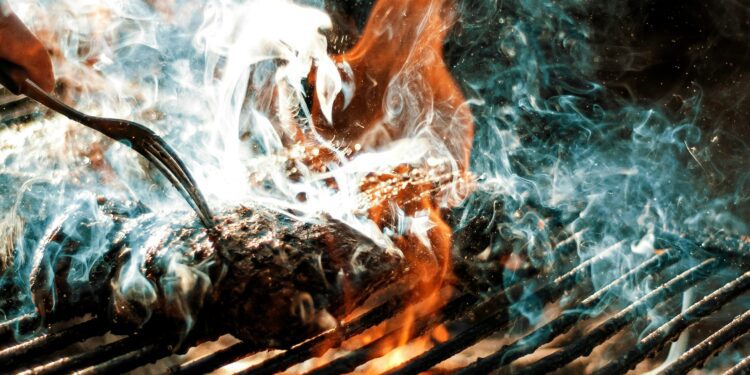Barbequing is a popular summer pastime enjoyed by many, but did you know that cooking meat over charcoal can potentially expose you to harmful carcinogens? As the smoke and heat from charcoal grilling interact with the meat, chemical compounds known as heterocyclic amines (HCAs) and polycyclic aromatic hydrocarbons (PAHs) are formed, which have been linked to an increased risk of cancer.
HCAs are formed when amino acids, sugars, and creatine in the meat react at high temperatures, such as those produced during grilling. PAHs, on the other hand, are created when fat and juices from the meat drip onto the hot charcoal, causing flames and smoke to rise and coat the meat with these toxic compounds.
HCAs and PAHs are chemicals that can form when meat, poultry, or fish is cooked at high temperatures, such as when grilling over an open flame. These substances have been linked to an increased risk of cancer, particularly colorectal, pancreatic, and breast cancer. The mechanism of action by which HCAs and PAHs contribute to the development of cancer is not fully understood, but it is believed that they can damage DNA and lead to the formation of cancerous cells.
Research has shown that consuming meat cooked at high temperatures, such as through grilling or barbequing, can lead to an increased risk of various types of cancer, including colorectal, pancreatic, and prostate cancer. Additionally, the American Institute for Cancer Research has stated that consuming well-done or charred meat may increase the risk of stomach cancer by up to 60%.
To reduce your risk of exposure to these harmful compounds while still enjoying the charred flavor of barbequed meat, there are a few steps you can take. Firstly, marinating the meat in acidic ingredients, such as vinegar or citrus juice, for at least 30 minutes before grilling can help reduce the formation of HCAs. Alternatively, pre-cooking the meat in an oven or microwave before finishing it on the grill can also reduce exposure to these harmful compounds.
Furthermore, using lean cuts of meat, trimming excess fat, and flipping the meat frequently while grilling can also help minimize the formation of HCAs and PAHs. Additionally, avoiding direct contact between the meat and the flames, by using a foil or a drip tray, can help prevent the meat from being exposed to the harmful smoke produced by the charcoal.
While barbequing can be a fun and enjoyable way to cook meat, it is important to be aware of the potential health risks associated with grilling over charcoal. By taking some simple precautions and following these tips, you can still enjoy a delicious barbequed meal while minimizing your exposure to carcinogens.
While it is still enjoyable to grill food outdoors, being mindful of cooking techniques and using caution can help reduce the risk of developing cancer. By being informed and proactive, individuals can continue to enjoy the tradition of barbecuing while also protecting their health.















